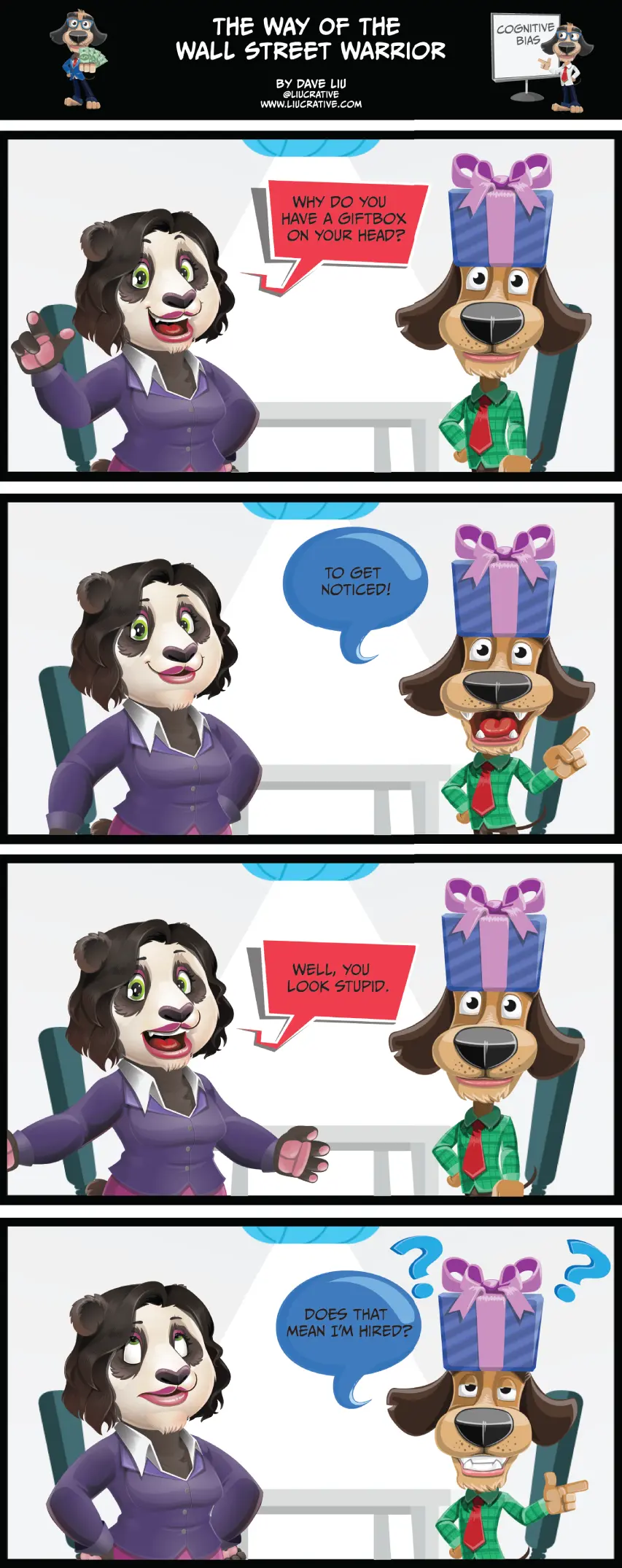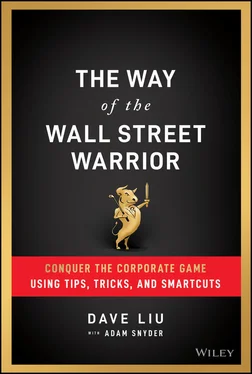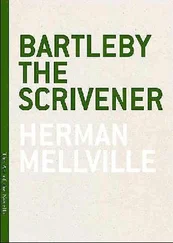Why Unus? Because the secret to getting in the door and ultimately getting what you want is projecting yourself as unique and taking advantage of scarcity. You're a durable good and you have to make others want to buy you , and only you . If you don't, then there is always some other chump who costs less, is more obedient, and is definitely better looking. So accentuate attributes that only a few can claim. Scarcity pays. Now hit that Send button!
What if you get rejected?
Step 1: Contact hiring manager.
Step 2: Get rejected.
Step 3: Be Unus.
Step 4: Try again; go back to Step 1.

CHAPTER 5 Strut Like a Peacock: Your First Impression Might Be Your Last
The interview process can take several rounds and will make you feel like you're a cast member in a reality game show, fighting for a coveted role while sizing up your competition. Your mantra has to be that you don't need to outrun a bear, just the other people it's chasing.
Rick Heitzmann, one of the founders of the venture capital firm FirstMark and former Houlihan Lokey banker, remembers as a kid working at a basketball camp run by Jay Wright, now the basketball coach of Villanova. Jay would say, “How bad do you want to be good?” and would tell the campers, “If you're tired, there are others who will gladly take your spot, so work as if you want it!”
I hope the campers remembered that advice, because for many jobs there will be thousands, if not tens of thousands, of wishful sycophants just like you competing for the same position. That means from the moment you walk in the door, you've got to stand out. You've got to show them the wow and do it quickly. From the first second you meet their gaze, you'll be sized up the way a tourist inspects Michelangelo's David . (Eyes up; get your mind out of the gutter.) In an instant, you'll be judged by what you're wearing, how you behave, how gracefully you shake a hand. Your interviewer will make a snap decision about who you are, your fitness for hard work, and your moral character.
Once again, I'm not making this stuff up. It's based on science and a very specific type of bias. Which one? Initial impression bias! Please don't tell me I need to spell this one out for you.
It won't be easy to break that first impression, so be sure it's a great one. Joanne Chen, general partner at Foundation Capital and former Jefferies banker, shared her experience: “There's no way I can be the stereotypical person people expect, so I don't even try. Instead, I focus on establishing credibility by being upfront and direct about my credentials and accomplishments.”
So strut like a peacock. Come across as optimistic and enthusiastic, but also as a big thinker, self-directed, bottom line–oriented, a team member who builds confidence in others. You've got a great sense of humor; you're a motivator who accomplishes goals by working well with others; you bring fresh ideas to solving problems.
Wow, you sound great. Even I'd hire you.
Frank Baxter, former CEO at Jefferies and later the U.S. ambassador to Uruguay, advises young people just starting out to think of themselves as their own CEO, their own Internet brand. “You're not John Smith,” he tells them. “You're www.JohnSmith.com.”
Present yourself as if you're the investment opportunity of a lifetime. That's what your parents thought when they plowed all that dough into your education and extracurricular boondoggles. Prove them right by transforming yourself from a money-losing dotcom into a cash-gushing staple.
Show your value by leveraging one of the most fundamental tenets of investing: the Greater Fool Theory. It states that the price of an object is determined not by its intrinsic value, but rather by irrational beliefs and expectations. As a result, an investor might pay a price that seems foolishly high because one may rationally have the expectation that the item can be resold to a greater fool later. The entire market economy is based on this principle. Don't believe me? Tell that to Diana Duyser, who was lucky enough to sell a partially eaten 10-year-old grilled cheese sandwich with the Virgin Mary's likeness on eBay for almost $30,000. Believe me now?
In other words, be the fool er , not the fool ee . The only way you're going to stop living off the Bank of Mom and Dad and leach onto the payroll of a real company is to convince someone you're an excellent investment. The way to do that is to know what a prospective employer is really asking.
Here, I'll make it simple for you. The following table is loosely based on the pitch deck template of Sequoia Capital, the venture capital firm which backed Apple, Google, PayPal, Yahoo!, and YouTube, among others. You get the picture—they're rich as hell.
| When You're Asked |
What They Want You to Answer |
| What's your purpose ? |
To make you rich(er) |
| What problem do you solve? |
A fresh body to replace the people who quit |
| What do you uniquely offer? |
Three Bs: Brains, brawn, beauty |
| Why now ? |
One can only live on bread and water so long. |
| What market can you go after? |
The sky's the limit. |
| Who else wants you? |
Who wouldn't? |
| What's your function ? |
Your wish is my command. |
| How do you make money ? |
Giving you leverage on your time |
| Are you a team player ? |
There's no “I” in team (but there is a “me”). |
| What's your ROI ? 1 |
Infinite! I'm not in it for the money. |
Now that you have your self-worth in order, it's time to deal with the superficial—how you look. You should have already researched enough about the companies where you're interviewing to have a pretty good idea about how people dress. Dress to impress, and by that I mean, mimic. Remember, we're basing this on concepts like initial impressionand affinity biasthat explain why people tend to hire people who are like themselves. So if you're interviewing at Google and you wear a three-piece suit for the interview, they'll either think you're an insurance salesman or someone just died. Conversely, if you show up in jeans and the latest James Perse T-shirt at Goldman Sachs, they'll either direct you to the plants that need watering or someone will call security to have you escorted out.
Therefore, dress accordingly and appropriately.
But then again, inappropriate can work, too. At Jefferies, I interviewed more than a thousand candidates. In all that time, I remember one person who didn't wear any socks. Obviously weird, but he did stand out. We referred to him as “No Socks Guy.” He had all the necessary qualifications and we were all set to make him an offer, until at the end of the day, we asked him, “Dude, why aren't you wearing socks?” He just said, “I forgot to pack them.” That dropped him in our estimation. If you come in with a black eye, you don't tell people you walked into a door. You saved a child from a 7-foot-tall kidnapper. Sockless guy should have told us they were stolen, or a bear got into his sock drawer, or he gave his pair to a homeless person just before entering the building. His answer had us worried he wouldn't pass the Cleveland Airport Test. “If I was stuck in some God-forsaken backwater hellhole like the Cleveland Burke Lakefront airport (not even Cleveland Hopkins International—they have a couple of good restaurants), would I want to have a frappé with this clown at the local McCafé?”
Читать дальше













